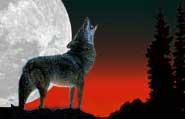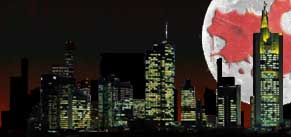


| |
|
by William D. Gagliani (Interview published in BookLovers, 1993) Forget everything you think you know about The City. Charles de Lint's novels conceal an urban edge, a sharp awareness of The City both as character and as mysterious setting. Danger lies beneath tranquil cityscapes, offset by a sense of comforting friendships and secret knowledge put first to the test and then to good use. Moonheart was classic urban fantasy, perhaps the first so labeled, followed by the likes of Mulengro, Yarrow, Greenmantle, Jack, The Giant-Killer, Drink Down the Moon, and The Little Country, each of which takes modern-day characters through a gateway to a parallel world only a chosen few can discern. A world, de Lint seems to say, that underlies our own reality. He is so convincing, and his characters so wistful, that the magic he presents matter-of-factly becomes, well, real. But magic needs a conduit. And Charles de Lint has found just the thing. His love of music weaves through his work like a plaintive melody, tying plots to characters and characters to emotions. In essence, he listens to the music of his characters. "I don't outline," de Lint explains, "I don't plan. I have a certain theme in mind and then I sit down every day and it's just like reading a book, finding out what happens next. It's like the stories are out there, and if I pay attention enough, I can write one down." This sort of self-discovery gives his work a fresh feel, a natural flow unhampered by over-plotting. It's significant to note that most of his stories do not end with apocalyptic events capping long quests, though the quest still plays a large role in his characters' motivation. And there's a strong sense of suspense that keeps readers not only interested, but caring. "Every story should have suspense, some kind of an edge, and it doesn't have to be a serial killer lurking around the corner, but something to make you want to keep turning the pages. I don't believe in writing something in which nothing happens. My prime concern, whether I'm writing or reading is character and story. I want characters I care about, and if I have characters I care about, then I'm going to care about what happens to them. Without those two things you don't have anything." Asked whether he associates more with Christy Riddell, a storyteller much like de Lint who appears in various Newford stories, or Christy's brother, Geordie, the carefree street fiddler, de Lint is quick to answer. "I'm aspects of all my characters. In some ways I feel that this is a repertory company and when I have a story to tell one of them says, 'I think that one would fit me. I think I could play that part.' I find it interesting to meet these characters in stories, then introduce a new character, and then take that character as a lead in a later story. It's like meeting friends. You like to know as much about them as possible." A theme that runs through de Lint's work is that of ordinary people who find, when they need it, that they carry music and/or magic within them, and part of the novel's quest is the process of coming first to believe and then to understand. Music plays a large role in Charles de Lint's fiction. And well it should, since he is an accomplished Celtic musician. "I still play gigs. I've been playing professionally for about 20 years. I also worked for 14 years in the record business, selling vinyl -- back when there was a thing called vinyl." If there's anything for which Charles de Lint is most noted, though, it's his incomparable blending of Celtic and North American mythologies. The strong symbolism of each seems to naturally wrap about the other, allowing the author to create a North American bardic tradition that feels right. His Canadian landscapes blur into Old World mythical systems to the haunting sound of the lonely piper, or of a Celtic harp. "I'd always been into folk tales and mythologies," he explains, "and at some point I ran across a copy of The Lord of The Rings, and from there I went on, exploring people like William Morris and Lord Dunsany." But genre blending came about simply because he could find no one working with the same seemingly disparate elements. "When you see me mixing Celtic with Indian mythologies with contemporary thrillers with Mafia stuff, it's not premeditated. It's merely the way the story felt right, something that I thought would be fun to read." A prolific and enthusiastic writer, book reviewer and critic, and
small press publisher, de Lint has branched out. As Samuel M. Key,
he has penned several overt Horror novels. He uses the pseudonym
so his Fantasy fans won't end up with something they won't like,
but doesn't mind if people know. Ironically, the musical and parallel
world themes surface even in his non-de Lint work. "My complaint is when publishers put inappropriate covers on books. Cover art is not just tacky, which it is half the time, but it's bad. But if it's going to be bad art, at least let it be something that looks like what's inside the book. That's all I ask for. I'm lucky about that these days." He's satisfied with the Berkeley covers for his Key novels. "I don't think they're good art, but they're appropriate." "The problem with fantasy, science fiction, and horror artists is the same problem we have with so much of the genre writing. They don't know the history of the field they're working in. Artists don't go back and look at all the superb artists throughout the centuries, they go and look at Frank Frazetta, or whoever happens to be the hot artist, and that's what they emulate. "What frustrates me is that, if you mention the classic fathers of the field to those working today, they haven't a clue whom you're talking about. Lord Dunsany. James Branch Cabell. We have people now who don't even know who Tolkien is." He relates overhearing some kids in a bookstore, dismissing J.R.R. Tolkien as a copy of Terry Brooks. He is amused by that, but you can also sense his keen displeasure. As one of the best working fantasists, de Lint underplays some of the recent fantasy-bashing carried out by science fiction writers. "I consider science fiction to be a branch of fantasy to begin with. I think the first stories that were told were fantasy stories, so it's our oldest branch of fiction, if we incorporate the oral tradition. I do think there's validity in a lot of the criticism. There's a lot of bad writing, but then again there's a lot of bad writing period. I just do the best I can, but I don't think that's necessarily so with all the stuff that comes out." His voice turns serious. "I do consider it almost a holy calling. I think it's a craft like anything else and you have to learn it. You can't expect to play a guitar like Segovia or Eddie Van Halen the first time you pick it up -- you expect to work on it. But many people feel they can't do that with writing, and that drives me crazy. So I think you have to learn it as a craft. But, that said, there's also a responsibility to do the best you can, to present not necessarily a moral universe but to offer something better. I don't agree with pessimistic writing. I don't think there should always be a happy ending, but I think there should always be hope involved. The themes in my books are simplistic, but I think they're the most important things, like trust and friendship, remaining true to friends, the fact that the family of choice is often more important than the family you're born into.... The world's a wonderful place, so let's take care of it and not screw it up more than we have already. They're very simplistic themes, but to me they're very important, as well. That kind of thing underlies everything I write, and I think often that's what touches my readership." Which brings us full circle. Look for Charles de Lint's Into the Green, coming in November,
and give this soft-spoken, talented Canadian writer a chance to
forever alter the way you look at your surroundings. The urban fantasy of Charles de Lint has inspired and amazed me over the years, much like the work of Tim Powers and James P. Blaylock. I credit these three authors with changing my perception of fantasy -- which I always thought of as too Tolkienesque -- and giving the genre a huge boost in the direction of magic realism. Call it North American magic realism, call it urban fantasy or contemporary fantasy, but whatever you do, don't call it stale! Looking for a place to start with de Lint? Moonheart and Trader are two of my favorites, as well as the more horror-tinged Mulengro.
|